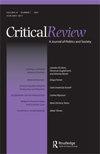The Changing Nature of Mass Belief Systems: The Rise of Concept and Policy Ideologues
IF 1.7
3区 社会学
Q4 POLITICAL SCIENCE
引用次数: 4
Abstract
ABSTRACT The proportion of the American electorate that is “constrained” by ideology has risen dramatically since Philip E. Converse suggested, in the early 1960s, that ideology is the province of only a small fraction of the mass public. In part, the rise of ideological voters has been obscured by the tendency of scholars after Converse to equate them with those who use terms referring to ideological concepts, such as liberal and conservative, in open-ended interviews. These “concept ideologues,” however, are not the only members of the public whose political opinions show evidence of ideological constraint. There is also a growing segment of the public, the “policy ideologues,” who take positions on three or more policy issues but do not happen to mention ideological concepts. Policy ideologues prove to be as politically knowledgeable as concept ideologues; their attitudes are nearly as constrained across issues and over time; and their policy stances usually “make sense” as liberal or conservative—not surprisingly, as they are almost as willing as concept ideologues to label themselves ideologically, when asked. By 2012, the portion of the public consisting of concept and policy ideologues had reached 42 percent. It declined to 38 percent in 2016, but was still a far cry from the 12 percent of the electorate whom Converse identified as ideologues or near ideologues as of 1956.群众信仰体系的本质变化:观念和政策意识形态的兴起
摘要自20世纪60年代初菲利普·E·匡威(Philip E.Converse)提出意识形态只属于大众的一小部分以来,受意识形态“约束”的美国选民比例急剧上升。在某种程度上,Converse之后的学者倾向于将意识形态选民与那些在开放式采访中使用自由派和保守派等意识形态概念术语的人等同起来,这掩盖了意识形态选民的崛起。然而,这些“概念理论家”并不是唯一一个政治观点显示出意识形态约束的公众。还有越来越多的公众,即“政策理论家”,他们对三个或三个以上的政策问题持立场,但碰巧没有提及意识形态概念。政策理论家被证明与概念理论家一样具有政治知识;随着时间的推移,他们的态度在各种问题上几乎同样受到限制;他们的政策立场通常“有道理”为自由派或保守派——毫不奇怪,因为当被问及时,他们几乎和概念理论家一样愿意给自己贴上意识形态标签。到2012年,由概念和政策理论家组成的公众比例达到42%。2016年,这一比例降至38%,但与匡威1956年认定的12%的理论家或近乎理论家的选民相比仍有很大差距。
本文章由计算机程序翻译,如有差异,请以英文原文为准。
求助全文
约1分钟内获得全文
求助全文
来源期刊

Critical Review
POLITICAL SCIENCE-
CiteScore
1.30
自引率
12.50%
发文量
17
期刊介绍:
Critical Review: A Journal of Politics and Society is a political-science journal dedicated to advancing political theory with an epistemological bent. Recurrent questions discussed in our pages include: How can political actors know what they need to know to effect positive social change? What are the sources of political actors’ beliefs? Are these sources reliable? Critical Review is the only journal in which the ideational determinants of political behavior are investigated empirically as well as being assessed for their normative implications. Thus, while normative political theorists are the main contributors to Critical Review, we also publish scholarship on the realities of public opinion, the media, technocratic decision making, ideological reasoning, and other empirical phenomena.
 求助内容:
求助内容: 应助结果提醒方式:
应助结果提醒方式:


